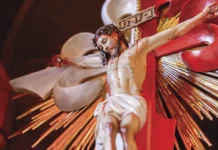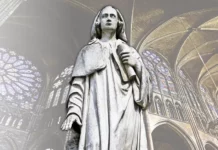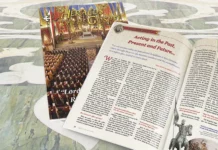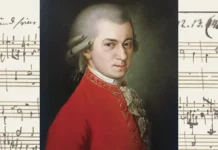In a world marked by laicism, it is difficult to have a clear notion of the true meaning of Holy Christmas and the immeasurable benefit that the Incarnation of the Second Person of the Blessed Trinity represents for humanity.
And the Word became flesh and dwelt among us” (Jn 1:14). In this simple way, the Beloved Disciple summarized the greatest event in history. His modest words sum up the rich and unfathomable essence of the mystery commemorated each December 25th. From the obscurity of the darkness of paganism, the dawn of our salvation appeared. He, who had been foretold by the prophets, the expectation of nations, became man.

A scene imbued with the supernatural
On the night in which Jesus came into the world, an atmosphere of peace and joy hovered over Bethlehem. Nature seemed to rejoice, while, inside an inhospitable grotto, a holy couple contemplated their newborn Son.
She is the Mother of mothers, conceived without original sin, a perfect creature, in whom the Creator deposited every grace. At her side is St. Joseph, her most chaste spouse, a just man whose love of God, integrity and wisdom made him worthy of such an august wife. And the Child whom they contemplate is God Himself, who assumed our nature to give the greatest possible proof of His love for humanity.
Imagine the holiness that would have enveloped that humble place! The setting in which the Divine Infant was born must have been so imbued with the supernatural that, had someone entered the grotto by chance, he would have become enraptured by grace.
This is what happened with the shepherds. After receiving the news from the Angels, they ran toward the grotto, where they found the King of the Universe lying upon a bed of straw. Stupefied by the grandeur of the scene, which they beheld with the eyes of faith, they felt impelled to prostrate in adoration. What an extraordinary gift they received—that of being the first to contemplate the Creator of Heaven and Earth made man, wrapped in swaddling clothes, lying in a manger!
God wanted to present Himself as a model of humility
Considering the awe-inspiring natural phenomena that accompanied God’s interventions in the Old Testament—the division of the sea, smoke from the mountain and fire from Heaven which reduced cities to ashes—the humility and discretion with which Christ came into the world is surprising.
On Christmas, would it not have been more in keeping with divine grandeur, that magnificent signs in Heaven and on earth mark the happening? At the very least, could not Jesus have been born in a magnificent palace with the greatest rulers on earth convoked to pay Him homage? For this to have taken place, a simple act of His will would have sufficed.
But, no, the Word preferred the grotto to a palace; He wanted to be adored by poor shepherds instead of great lords; He warmed Himself with straw, and the breath of animals, instead of with sumptuous coverings and the heat a flaming brazier. And He did not want to order the cold to spare Him. In a sublime paradox, infinite Majesty presented Himself as a model of humility.
Despite these poor trappings, the Child was the Second Person of the Blessed Trinity. Within Him was the realization of the hypostatic union of divine and human nature, as the renowned Father Boulenger explains: “Union is the state of two things that are joined together. It can be realized either in the natures—as, for example, when body and soul unite to form one single human nature—or in the person, when two natures unite in the same person. This latter union is called hypostatic because, in Greek, the two terms, hypostasis (support) and person, have the same theological meaning.”1
And after the union, these two natures remained perfectly integral and distinct in the Person of Christ, who is not human, but divine. This is why He is called God-Man.
Insuperable abyss
However, why did the Second Person of the Blessed Trinity become incarnate in such an inferior nature?
Our first parents were created in earthly paradise in a state of original innocence; therefore, in justice and holiness.2 Furthermore, in His infinite goodness, God conferred on Adam three types of gifts: the natural, so that all the properties of body and soul were perfectly ordained to reach their natural end; the supernatural, sanctifying grace—a participation in the very life of God and the predestination to the vision of God in eternal blessedness; and the preternatural, such as infused knowledge, the dominion over the passions and immortality, which constitute the gift of integrity.
Alongside these enormous benefits, man was faced with a trial. He was called to fulfil the divine law in an exemplary manner, guided by the demands of the natural law engraved in his heart, and respecting the only specific norm that God had given him: the prohibition to eat the fruit of the tree of the knowledge of good and evil, in the centre of the Garden of Eden (cf. Gen 2:9-17).

Sacred Scripture tells us how the serpent tempted Eve and how our first parents fell and were expelled from Paradise (cf. Gen 3:1-23). As a consequence of sin, many of these privileges were withdrawn. However, God, in His infinite mercy, continued to give them the natural privileges, as the learned Father Tanquerey describes: “He was content to deprive them of the special privileges that He had conferred upon them; that is, the gift of integrity and habitual grace: but left them with their nature and the natural privileges. It is certain that the will was weakened, if we compare it to what it was like with the gift of integrity; but it is not evident that it was weaker than it had been in the natural state.”3
Original sin opened an insuperable abyss between God and men. The gates of Heaven were closed and contingent man could only offer God imperfect reparation for the offence committed. And the Son offered Himself to the Father and “became obedient unto death, even death on a cross” (Phil 2:8), restoring to man the grace lost by sin. With ineffable generosity, the Creator Himself became a creature to settle our debt.
The path of glory is through the Cross
But why did Jesus want to suffer the contempt of His contemporaries and the torments of the Passion? Being hypostatically united to the Second Person of the Blessed Trinity, any gesture of His human nature could have redeemed all of humanity. A simple act of Christ’s will would have sufficed to obtain from God the pardon of all of our sins.
However, once again, we encounter a sublime paradox. With the example of His Life and Passion, Jesus wanted to teach us that, in this valley of tears, true glory can only be born of pain. And as the Father desired the greatest possible degree of glory for His Son, He permitted that He endure the ultimate extremes of suffering.
“The Son of man came not to be served but to serve, and to give His life as a ransom for many” (Mt 20:28). Even in the manger of Bethlehem, our Saviour was aware that He had come into the world to expiate our sins. For this reason, in many nativity scenes, the Divine Infant is presented to us with arms open in the form of a cross. During His entire life, from Bethlehem to Golgotha, Jesus continually advanced toward the Supreme Sacrifice that would bring Him to the apex of glory.
The face of the earth was renewed
Could there be anyone weaker than a child, any dwelling simpler than a grotto and any crib poorer than a manger? Yet, the Child whom we contemplate resting on straw in the grotto of Bethlehem would completely change the course of earthly events.
Austrian historian John Baptist Weiss affirms: “Christ is the centre of historic events. The ancient world awaited Him; the modern and future world repose upon Him. The Redemption of humanity by Christ is the greatest feat of universal history; His Life, the noblest and most beautiful monument that humanity possesses; His doctrine, the measure by which everything is evaluated.”4

In a world marked by relativism and laicism—when not by atheism—it is difficult to have a clear notion of the true meaning of Holy Christmas and the immeasurable benefit that the Incarnation of the Second Person of the Blessed Trinity represents for humanity.
Christ was the man promised to Adam after his fall—the Messiah foretold over centuries by the prophets. Reality, however, transcended all human imaginings: who could have thought that He would be God Himself incarnate?
Jesus’ coming into the world not only opened the gates of Heaven and brought us salvation, but it also renewed the face of the earth. St. Thomas states that Our Lord desired baptism, among other reasons, to sanctify the waters.5 The same occurred with the other elements: the earth was sanctified by the touch of His divine feet; the air, because He breathed it, and fire burned with greater intensity and purity. We can affirm with certainty that our world was forever changed after the Creator Himself became man and lived in it.
It is not by chance that the years are counted from the birth of Christ. He truly divides history in two. Before His coming humanity was one way; after, it was entirely another. There are two histories. We could almost say that there are two universes! ◊
Notes







